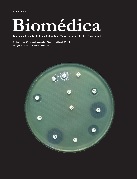Evolution of antimicrobial resistance in Gram negative bacilli from intensive care units in Colombia
Abstract
Introduction: The continuous evolution of antimicrobial resistance poses a major threat to public health worldwide. Molecular biology techniques have been integrated to epidemiological surveillance systems to improve the control strategies of this phenomenon.
Objective: To describe the phenotypic and molecular profiles of the most important Gram negative bacilli from intensive care units in 23 Colombian hospitals during the study period 2009-2012.
Materials and methods: A descriptive study was conducted in 23 hospitals belonging to the Colombian Nosocomial Resistance Study Group. A total of 38.048 bacterial isolates were analyzed using WHONET over a four-year period. The antimicrobial resistant profiles were described for Escherichia coli, Klebsiella pneumoniae, Pseudomonas aeruginosa, and Acinetobacter baumannii. Polymerase chain reaction was performed in 1.248 strains to detect the most clinically relevant carbapenemases.
Results: Escherichia coli was the most frequently isolated organism (mean=14.8%). Frequency of K. pneumoniae increased significantly from 11% in 2009 to 15% in 2012 (p<0.001). All screened isolates had rising trends of multidrug-resistant profiles. KPC (Klebsiella pneumoniae carbapenemase)
was detected in 68.4% of K. pneumoniae isolates while VIM (Verona integron-encoded metallo-betalactamase) was present in 46.5% of them.
Conclusion: In this study, an increase in the trend of multidrug-resistant organisms and a wide distribution of carbapenemases was observed. The integration of molecular biology to surveillance systems allowed the compilation of this data, which will aid in the construction of guidelines on antimicrobial stewardship for prevention in Colombia.
Downloads
Some similar items:
- Constanza Pardo, Ricardo Cendales, Survival analysis of cervical cancer patients , Biomedica: Vol. 29 No. 3 (2009)
- Raúl Murillo, Ricardo Cendales, Carolina Wiesner, Marion Piñeros, Sandra Tovar, Effectiveness of cytology-based cervical cancer screening in the Colombian health system , Biomedica: Vol. 29 No. 3 (2009)
- Sandra Lorena Girón, Julio César Mateus, Fabián Méndez, Impact of an open waste disposal site on the occurrence of respiratory symptoms and on health care costs of children , Biomedica: Vol. 29 No. 3 (2009)
- José Joaquín Carvajal, Ligia Inés Moncada, Mauricio Humberto Rodríguez, Ligia del Pilar Pérez, Víctor Alberto Olano, Characterization of Aedes albopictus (Skuse, 1894) (Diptera:Culicidae) larval habitats near the Amazon River in Colombia , Biomedica: Vol. 29 No. 3 (2009)
- Andrés Páez, Gloria Rey, Carlos Agudelo, Alvaro Dulce, Edgar Parra, Hernando Díaz-Granados, Damaris Heredia, Luis Polo, Outbreak of urban rabies transmitted by dogs in Santa Marta, northern Colombia , Biomedica: Vol. 29 No. 3 (2009)
- Patricia Escobar, Katherine Paola Luna, Indira Paola Hernández, César Mauricio Rueda, María Magdalena Zorro, Simon L. Croft, In vitro susceptibility of Trypanosoma cruzi strains from Santander, Colombia, to hexadecylphosphocholine (miltefosine), nifurtimox and benznidazole , Biomedica: Vol. 29 No. 3 (2009)
- Gustavo Pradilla, Julio César Mantilla, Reynaldo Badillo, Human rabies encephalitis by a vampire bat bite in an urban area of Colombia , Biomedica: Vol. 29 No. 2 (2009)
- Mauricio Beltrán, María Cristina Navas, María Patricia Arbeláez, Jorge Donado, Sergio Jaramillo, Fernando De la Hoz, Cecilia Estrada, Lucía del Pilar Cortés, Amalia de Maldonado, Gloria Rey, Seroprevalence of hepatitis B virus and human immunodeficiency virus infection in a population of multiply-transfused patients in Colombia , Biomedica: Vol. 29 No. 2 (2009)
- Rosa Magdalena Uscátegui, Adriana M. Correa, Jaime Carmona-Fonseca, Changes in retinol, hemoglobin and ferritin concentrations in Colombian children with malaria , Biomedica: Vol. 29 No. 2 (2009)
- Claudia M.E. Romero-Vivas, Luis Eduardo Castro, Lila Visbal, Ana María Santos, Esther Díaz, Cutaneous myiasis by Cochliomyia hominivorax (Coquerel) (Díptera Calliphoridae) in Hospital Universidad del Norte, Soledad, Atlántico , Biomedica: Vol. 29 No. 1 (2009)
| Article metrics | |
|---|---|
| Abstract views | |
| Galley vies | |
| PDF Views | |
| HTML views | |
| Other views | |


























